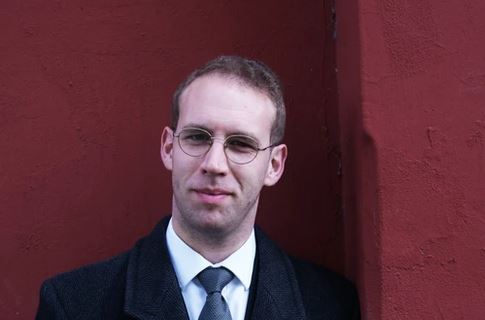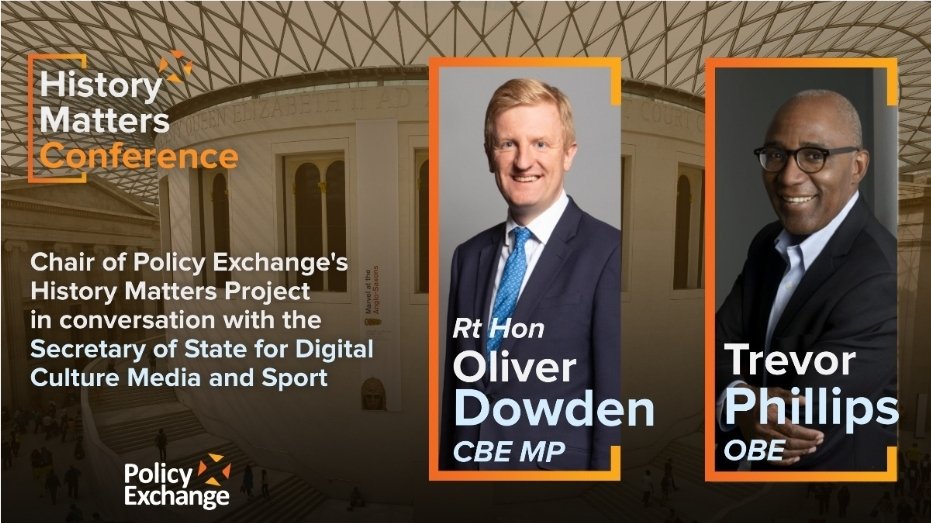BCRPM member Stuart O'Hara attended online, the 4 hour long Policy Exchange, History Matters Conference, on Tuesday 02 March 2021 and summed it up below.

It’s said that the most important decisions at conferences are made in the coffee breaks. But how so over Zoom? The liveliest discussions by far at thePolicy Exchange’s History Matters Conference took place in the delegates’ chat. Questions fielded were rehearsed there, but there was a parallel and, in the case of the first panel, far more diverse dialogue taking place, not restricted to breaks between sessions. How would this play out in the real world? Would the frequently eloquent delegates have steered the panel, or would they have tempered their contributions? Most curiously, would those whose questions were not chosen (some of which were, of course, more of a statement) have protested as much at their not receiving the mic? It was later revealed that the chat window was not visible to the panels.
PANEL 1: STATUES AND THE PUBLIC SPACE
Chair: Peter Ainsworth (Chair, The Heritage Alliance)
Sir Laurie Magnus(Chair, Historic England)
Dr Zareer Masani(Historian and author)
Prof Evelyn Welch (KCL Interim President & Principal Jan-June 2021)
A panel far too much in agreement with itself, according to delegates! That said, there were pertinent contributions, such as Prof Welch’s explanation that the targeted statue of Sir Thomas Guy (and its plinth) is the property of Guy’s Hospital Trust, the base and railings that of KCL, and the whole grade II listed – a complexity not dissimilar to the pas de deux between the BM Trustees’ and the government’s custody of the Marbles. The apportioning of the Church of the Holy Sepulchre in Jerusalem also came to mind, though perhaps that’s not a useful model if an outcome is sought in the foreseeable future. It was pointed out that the world beyond Bristol knows Edward Colston far better since his statue came down – there is a parallel here, I think, with the phenomenon that the general public, upon introduction to the Marbles debate, tend to favour reunification.
PANEL 2: MUSEUMS AND GALLERIES
Chair: Nicholas Coleridge CBE (Chair, V&A)
Sir Ian Blatchford(Director, Science Museum Group)
Dr Laura van Broekhoven(Director, Pitt Rivers Museum)
Sharon Heal (Director, Museums Association)
Dr Samir Shah CBE (Chair, Museum of the Home)
This was more like it. A broader panel, and with it a good deal more spirit in answering how museums and galleries should respond to and remain representative of their public. The Science Museum’s Ian Blatchford distinguished between ‘shared’ and ‘contested’ heritage, the former being preferable and more harmonious, in theory. But surely Britain’s colonial history creates a hegemony which makes contest necessary en route to any possible sharing of heritage? Sharon Heal, of the Museums Association, dissected the current governmental stance of ‘retain and explain’, saying that museums are already very good at the latter, but that retain, as a starting point, hampers their mission. This report could have consisted solely of quotations from Dr Shah, but his most incisive question must suffice: who are we listening to? Visitors? Parents? Academics? Politicians? No answer came forth.
A lot of this is only peripheral to the question of the Parthenon Marbles, granted, but as the Marbles stated the ‘original’ debate on contentious statuary in this country, we’d be fools not to keep abreast, and present our arguments in light of, what’s going on. Indeed, it came to mind more than once that several key points from our reunificationist arguments, specifically the distinction between cultural(/ethnic) and national(/political) identity, would be useful additions to the vocabulary of the cultural heritage issues currently having their moment. Furthermore, the Marbles are a (post)colonial issue, taken from one occupied imperial territory by the official representative of another empire. There was little talk of reunification. That’s unsurprising given ‘retain and explain’, but it sat awkwardly with the general agreement on the return of Benin Bronzes and withdrawing human remains from display (the latter are something quite different from our concerns, of course).
IN CONVERSATION
Rt Hon Oliver Dowden MP (Secretary of State for Digital, Culture, Media and Sport)
Pa OBE (Chair, Policy Exchange’s History Matters Project)

I had modest hopes for Mr Dowden, a minister who I’m led to believe actually reads his brief, but sadly he turned in a rather predictable sequence of soundbites about “honouring our rich culture/heritage/history”, “not preserving history in aspic” (three times!), a swipe at post-war architecture, and references to an anonymous “left …holding universities/museums to ransom”. By the time he assured us that Nelson was in no danger of leaving his Column, in response to a rather facetious question from Trevor Phillips, it all felt a bit silly. To his credit the word ‘woke’ (long since divorced from its original meaning) never passed his lips, despite the odd mention earlier in the afternoon. Perhaps it was too much to expect a member of government to issue anything other than the party line of ‘conserve/retain and explain’. A reference to “strong societies” not airbrushing their history left an unpleasant taste (of self-righteous colonialism) in the mouth, though probably not that of the right honourable gentleman.
Only two questions from delegates were put to the Minister, one by an articulate young woman asking what the government does to represent those not represented by the status quo or by campaign groups. His answer warned about the presence of subversive elements (‘activists’) in campaign groups, so perhaps it’s too much to hope that fielding the Marbles question would have yielded a useful answer - but it was a shame not to have the opportunity to ask. There were countless mentions of ‘constructive/rigorous debate’ this afternoon, but in the current cultural moment that all -too -often means giving non-mainstream views a brief airing, and then continuing exactly as before. As Trevor Phillips asked, “Have you got the stomach for this kind of fight? Because what governments tend to do is wrap up in a warm blanket and walk away”. No answer came forth.
Toward the end, Phillips said “[History Matters] would hope… to get away from people using history as a combat weapon”. Keeping abreast of current trends and mores in museology and cultural heritage is essential in our campaign for the reunification of the Parthenon Marbles, and I believe we do that pretty well. If there’s a desire to avoid the (unwarranted) weaponization of history, and the wind may be blowing that way, I believe that’s a vindication of our use of well-researched arguments and of the collaborative nature of our proposed solutions down the years. But when we do get to have our say, when the debate is over, things can’t just continue as before.
To contact Stuart, kindly visit his website here.